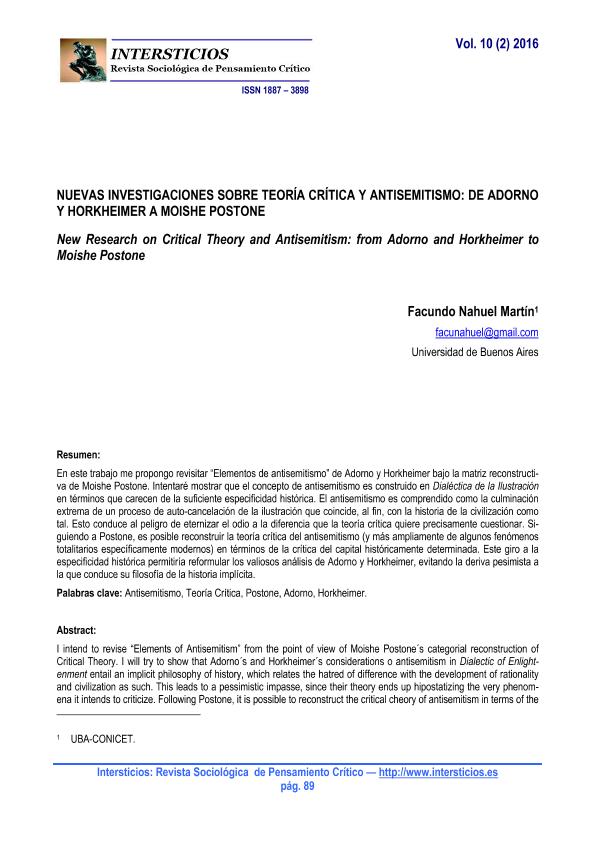Mostrar el registro sencillo del ítem
dc.contributor.author
Martín, Facundo Nahuel

dc.date.available
2020-10-23T14:07:41Z
dc.date.issued
2016-10
dc.identifier.citation
Martín, Facundo Nahuel; Nuevas investigaciones sobre teoría crítica y antisemitismo: de Adorno y Horkheimer a Moishe Postone; Universidad Complutense de Madrid. Facultad de Ciencias Políticas y Sociología; Intersticios; 10; 2; 10-2016; 89-107
dc.identifier.issn
1887-3898
dc.identifier.uri
http://hdl.handle.net/11336/116730
dc.description.abstract
En este trabajo me propongo revisitar “Elementos de antisemitismo” de Adorno y Horkheimer bajo la matriz reconstructiva de Moishe Postone. Intentaré mostrar que el concepto de antisemitismo es construido en Dialéctica de la Ilustración en términos que carecen de la suficiente especificidad histórica. El antisemitismo es comprendido como la culminación extrema de un proceso de auto-cancelación de la ilustración que coincide, al fin, con la historia de la civilización como tal. Esto conduce al peligro de eternizar el odio a la diferencia que la teoría crítica quiere precisamente cuestionar. Siguiendo a Postone, es posible reconstruir la teoría crítica del antisemitismo (y más ampliamente de algunos fenómenos totalitarios específicamente modernos) en términos de la crítica del capital históricamente determinada. Este giro a la especificidad histórica permitiría reformular los valiosos análisis de Adorno y Horkheimer, evitando la deriva pesimista a la que conduce su filosofía de la historia implícita.
dc.description.abstract
I intend to revise “Elements of Antisemitism” from the point of view of Moishe Postone´s categorial reconstruction of Critical Theory. I will try to show that Adorno´s and Horkheimer´s considerations o antisemitism in Dialectic of Enlightenment entail an implicit philosophy of history, which relates the hatred of difference with the development of rationality and civilization as such. This leads to a pessimistic impasse, since their theory ends up hipostatizing the very phenomena it intends to criticize. Following Postone, it is possible to reconstruct the critical cheory of antisemitism in terms of the historically determinate categories of the critique of capital. This turn to historical specificity would allow for a recovery of some valuable insights in Dialectic of Enlightenment, but in terms that avoid the pessimistic consequences of it´s originally implicit philosophy of history.
dc.format
application/pdf
dc.language.iso
spa
dc.publisher
Universidad Complutense de Madrid. Facultad de Ciencias Políticas y Sociología
dc.rights
info:eu-repo/semantics/openAccess
dc.rights.uri
https://creativecommons.org/licenses/by-nc-sa/2.5/ar/
dc.subject
Antisemitismo
dc.subject
Teoría Crítica
dc.subject
Adorno y Horkheimer
dc.subject
Postone
dc.subject.classification
Tópicos Sociales

dc.subject.classification
Sociología

dc.subject.classification
CIENCIAS SOCIALES

dc.title
Nuevas investigaciones sobre teoría crítica y antisemitismo: de Adorno y Horkheimer a Moishe Postone
dc.title
New Research on Critical Theory and Antisemitism: from Adorno and Horkheimer to Moishe Postone
dc.type
info:eu-repo/semantics/article
dc.type
info:ar-repo/semantics/artículo
dc.type
info:eu-repo/semantics/publishedVersion
dc.date.updated
2020-10-20T18:18:27Z
dc.journal.volume
10
dc.journal.number
2
dc.journal.pagination
89-107
dc.journal.pais
España

dc.journal.ciudad
Madrid
dc.description.fil
Fil: Martín, Facundo Nahuel. Consejo Nacional de Investigaciones Científicas y Técnicas; Argentina. Universidad de Buenos Aires; Argentina
dc.journal.title
Intersticios
dc.relation.alternativeid
info:eu-repo/semantics/altIdentifier/url/https://www.intersticios.es/article/view/16178
Archivos asociados
